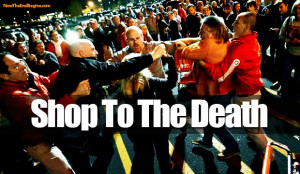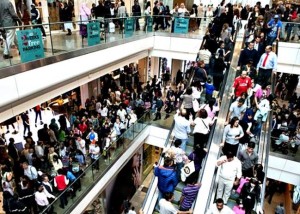As it gets closer to the holiday season, many people are out to buy gifts for friends, family, and other loved ones. According to the San Diego Union-Tribune, here is a ranked list of the days in which the most customers are in stores during the year, which all happen to fall in the upcoming months:
- Friday Nov. 23 (Black Friday)
- Saturday Dec. 22 (Last weekend before Christmas)
- Saturday Dec. 15

- Saturday Dec. 8
- Wednesday Dec. 26 (Day after Christmas)
- Sunday Dec. 23 (Last weekend before Christmas)
- Saturday Nov. 24 (Small Business Saturday)
- Friday Dec. 21 (Last weekend before Christmas)
- Sunday Dec. 16
- Saturday Dec. 1.
Black Friday is the Friday following Thanksgiving Day. On this day, most stores open extremely early and have amazing sales and promotions in order to attract customers to purchase their products at a reasonable, low price. On the surface, Black Friday is by far the most popular shopping day of the year, and also seems the most exciting. In 2014, $50.9 billion was spent during the 4-day Black Friday weekend by approximately 133 million U.S. consumers (Breaking News). If there are phenomenal deals and an enormous amount of sales, it seems that nothing could possibly go wrong. However, that is far from the truth. Black Friday has turned into a day of selfishness and madness, and can be extremely scary to everyone involved.
The name Black Friday itself originated in Philadelphia, Pennsylvania. Originally it was used to describe the heavy traffic from travel that would occur on the day after Thanksgiving, with families rushing to get back home from their endeavors of the previous day. Around 1975, an additional explanation was made for this name; retailers traditionally operated at a financial loss (“in the red”) from January through November, and “Black Friday” indicated the point at which retailers began to turn a profit, or get “in the black”(The London School). Especially going into the holiday season with the month of December approaching, companies knew they could pick up their losses starting on this day, and so they made it an official, large day of sales. Because there are so many sales and only so many of the products being offered, people turn mad and fight to make sure they receive the best deals for the products they feel that they desperately need.
 Each year there are reports of extreme violence during the Black Friday sales, resulting in horrible fights, injuries, and even death. It is terrifying to know that people go into stores looking to save money, but end up having to spend more than they could have ever imagined on medical expenses. What causes people to kick, shove and even stab each other on Black Friday? The reasons that go through peoples’ minds are primal, and that people fall into an instinctive state to fight (Reuters). Human brains are hardwired for violence, and therefore, fall into a state of making sure to obtain their desires in whatever way possible, falling into an argument over competition if necessary. According to Kenneth Manning, a professor of marketing at Colorado State University, “People truly want to get a good deal, and so they might be less rational…Their decision-making can be somewhat emotional” (Live Science). People stop thinking rationally and turn into a state of “fight or flight”. Shopping is often compared to hunting or gathering, this day being one of the many reasons.
Each year there are reports of extreme violence during the Black Friday sales, resulting in horrible fights, injuries, and even death. It is terrifying to know that people go into stores looking to save money, but end up having to spend more than they could have ever imagined on medical expenses. What causes people to kick, shove and even stab each other on Black Friday? The reasons that go through peoples’ minds are primal, and that people fall into an instinctive state to fight (Reuters). Human brains are hardwired for violence, and therefore, fall into a state of making sure to obtain their desires in whatever way possible, falling into an argument over competition if necessary. According to Kenneth Manning, a professor of marketing at Colorado State University, “People truly want to get a good deal, and so they might be less rational…Their decision-making can be somewhat emotional” (Live Science). People stop thinking rationally and turn into a state of “fight or flight”. Shopping is often compared to hunting or gathering, this day being one of the many reasons.
As an industry, shopping has become a psychological game. On Black Friday above all other days, stores use psychological manipulation to its fullest extent in order to get the greatest possible result. For example, having slow music playing throughout the store slows down customer walking paces and thinking processes, which allows for more browsing, and therefore, more purchases. Stores also try to invoke positive feelings of satisfaction in customers. When the brain knows it will be getting a good deal, products seem more desirable, and are more frequently purchased. “Marketing professor Peter Darke of York University in Toronto carried out a study in which volunteers were given $10 and asked to make a purchase at a university store. Some of them got to keep the change, while others had to give it back to the researchers. Unsurprisingly, those who got to keep the change were happier with the better deal they got” (Live Science). This study is an example of how the brain responds to emotions in spending. When these customers could keep the change, they thought they were getting a great deal compared to the ones who could not keep it.
But deals don’t always leave people thrilled and unharmed. As I previously stated, many people do get injured on these days. Jdimytai Damour was a victim to the blood of Black Friday in 2008. He was trampled before sunrise on Black Friday Friday by rampaging shoppers running into a Wal-Mart store where he was working as a maintenance man for the holidays (New York Times). A man simply was doing his job, and got killed by angry shoppers fighting to make sure they got the deals that were important to them. Many more incidents like this are happening each and every year by careless and rambunxious people. During Black Friday events in 2014, a fight break out at a Walmart store over a Barbie doll. Two women competed in a “pushing and shoving match” over the last doll available. One female allegedly threw a punch, which lead to a large fight in which the police needed to be called (Syracuse News). Thinking in a rational mind, this never would have happened. However on this day, people fall back into their primal states.
many people do get injured on these days. Jdimytai Damour was a victim to the blood of Black Friday in 2008. He was trampled before sunrise on Black Friday Friday by rampaging shoppers running into a Wal-Mart store where he was working as a maintenance man for the holidays (New York Times). A man simply was doing his job, and got killed by angry shoppers fighting to make sure they got the deals that were important to them. Many more incidents like this are happening each and every year by careless and rambunxious people. During Black Friday events in 2014, a fight break out at a Walmart store over a Barbie doll. Two women competed in a “pushing and shoving match” over the last doll available. One female allegedly threw a punch, which lead to a large fight in which the police needed to be called (Syracuse News). Thinking in a rational mind, this never would have happened. However on this day, people fall back into their primal states.
Here is a raw video of shoppers being trampled at a Target store on a Black Friday event:
Overall, Black Friday is a shopping day that can have very positive results for all parties involved; people can purchase gifts for very reasonable prices for the holiday season, and stores can make large sums of money. People love the thrill of a good deal, and therefore, are very likely to participate in this day each year. However, good intentions may very well go wrong, and it is important to remember to be safe in times of panic and distress. Black Friday is a holiday to some, and should not have to be remembered as a day that many will mourn. Black Friday is by far the most popular shopping day of the year, and also seems the most exciting. Black Friday needs to be a day that people stick to their values, be cautious of others, and most importantly, have fun and purchase great deals!
Sources:
http://www.sandiegouniontribune.com/news/2012/nov/07/busiest-shopping-day-holidays-black-friday-again-a/
http://www.breakingnews.com/topic/black-friday/
http://blogs.reuters.com/great-debate/2014/11/23/the-scientific-explanation-of-why-people-kill-each-other-over-tvs-on-black-friday/
http://www.livescience.com/10290-black-friday-psychology-mad-deals.html
http://www.nytimes.com/2008/11/30/nyregion/30walmart.html?_r=1&
http://www.syracuse.com/news/index.ssf/2014/11/black_friday_2014_fights_walmart_barbie_mall_arrests_tesco_uk.html

As someone who worked a retail job throughout high school (I work at Target), I have experienced from a retailers perspective of how crazy this can be. People will line up around our store, hours in advance, in order to get the best deals on that new TV. The lines are crazy all day, you are constantly ringing up people, and really have no time to think or take a break. Some people who have been shopping all night come into the store really crabby and irritable. One time, I had someone argue with me over 25 cents they thought I owed them, however, I could tell they were out all night and were just looking to argue with someone. It’s a crazy day and is not much fun to work
The deals on black friday are unbeatable, but as that video you posted shows, people are animals when it comes to shopping and “getting the good deal”; so Black Friday terrifies me. It makes you wonder though, the expression that goes around, “The day before, you were thankful for what you had. Today, you’re literally running over people to get more for you”
I really enjoyed this post! I thought it was super interesting how you looked into the positive and negative results of black Friday shopping. However I think this issue could be developed a little further into the idea of science, since this is a blog for science class. To add my own personal anecdote, I have never gone out shopping on black Friday because I have always been too afraid of what I will run into. I hate shopping regardless of what day, but I have always heard horrible things about black Friday and therefore have never wanted to experience it for myself. However, because that’s an anecdote of the experience, I’m sure some people can say that they have had great experiences while at black Friday.